As the crowd heaves at Singapore's popular Zouk nightclub, a Malaysian rapper in a crisp red-and-white tracksuit takes to the stage, working up the audience with shouts of "Come on, put your hands up!"
The phrase, almost a cliche in the cult of American hip-hop music, whips the crowd listening to Malaysian rap duo Too Phat into a frenzy.
The staccato beats and displays of urban ghetto fashion could place the scene in any of hundreds of US or European clubs.
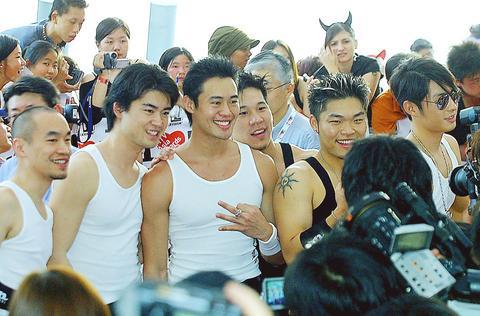
PHOTO: AFP
"Too Phat's really good but they need to be exposed more outside of Malaysia," gushed Anna Hazlett, a 19-year-old British student. "But I think they could be popular in the UK."
The increasingly global appeal and popularity of hip-hop could thrust Asian acts such as Too Phat before a wider audience, music industry executives say -- possibly even into the tough North American market.
EMI Group Plc signed Too Phat in 1998 -- through its "Positive Tone" label -- and Singapore hip-hop group "Urban Xchange" in February. Both could find appeal at home and abroad, said Caroline Qwek of EMI Music South East Asia.
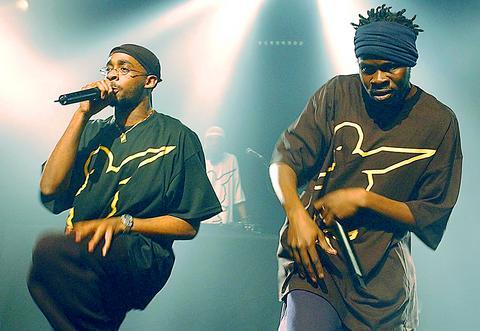
PHOTO: AFP
"Asian hip-hop music has come a long way and I think Too Phat certainly has the potential to do a lot more," said Qwek, an international marketing director.
In China, a new "Generation Y" has embraced hip-hop as an emblem of free-spirited expression while the sound has been a dominating influence in Tokyo sub-culture since the late 1980s.
Artists such as Taiwan's Machi and South Korea's Drunken Tiger also have strong local followings although their appeal is limited somewhat by lyrics written in their native language.
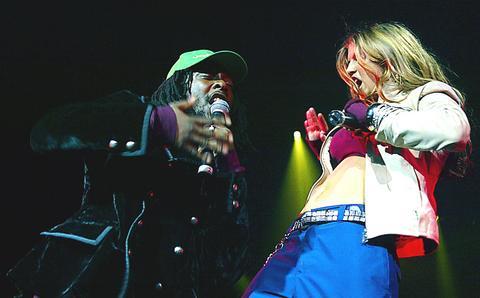
PHOTO: AP
But even Asian-language rap is being touted with some potential, experts say, citing the musical success of jazzy French rapper Claude M'barali, aka MC Solaar, whose fluid phrasing made up for a lack of English to generate strong US, British and Australian record sales in the mid-1990s.
"Sometimes people typecast Asian acts as merely mirroring what the West puts out.
"But I think through acts like Too Phat, Urban Xchange and Zircon, there are a lot of sounds that are slowly evolving to become very Asian-centric," said Qwek.
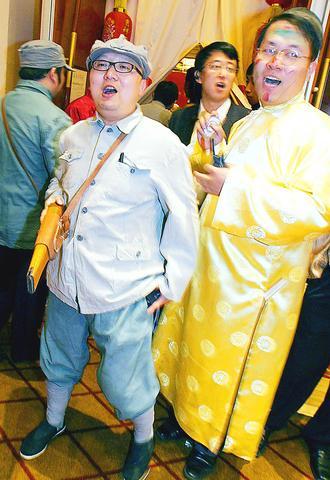
PHOTO: AFP
For now, Asian artists aspiring to see their names on US and European charts may want to focus on collaborations with Western artists, said Mishal Varma, vice president of programming and talent at MTV Networks Asia.
The recent MTV Asia awards held in Singapore saw pop singer Gareth Gates, winner of Favorite Male Artist, sing a duet with popular Malaysian singer Siti Nurhaliza, while Stacie Orrico performed Stuck with Urban Xchange and Too Phat.
"We intend to do much more of these collaborations ... because they come in as an underlying endorsement," said Varma, who also handles artist relations for the music network.
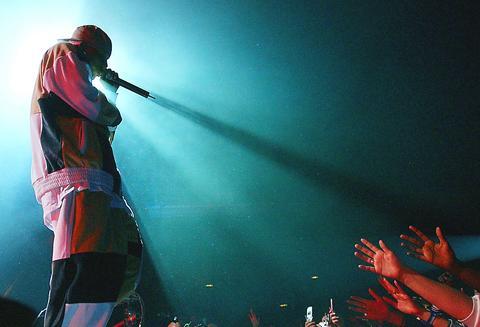
PHOTO: EPA
Too Phat have rapped since 1998, before hip-hop evolved into a multimillion-dollar industry in Asia. But not until their collaboration with international artist Warren G on a track in their third album, 360 degrees, did their popularity surge.
In the album, which went platinum in Indonesia and Malaysia, Too Phat raps about money, fame and love, sometimes incorporating Malay traditional music, or keroncong.
But widening their appeal outside Asia could be difficult.
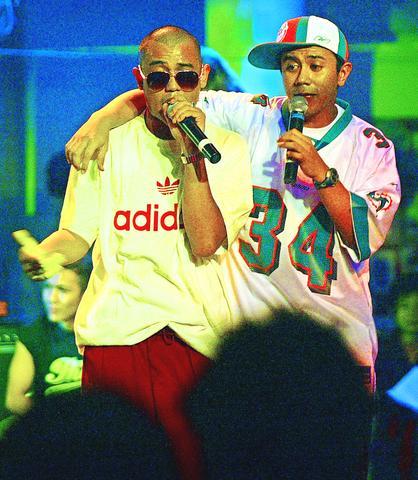
PHOTO: REUTERS
"It's going to be really tough for them," said Spencer Ball, who has worked as a disc jockey in Singapore for five years.
"For Western MTV viewers to see Asian groups, even though the sound is right, it's a big paradigm shift. It will be hard. They don't look like the usual boy bands that dominate in the West."
Coming from Asia, many artists are also under pressure to differentiate their music from established Western acts such as 50 Cent and Grammy Award winner OutKast, especially given hip-hop's overwhelming association with American urban culture.
"I keep repeatedly telling Too Phat why don't you add some Asian sounds to it to make it sound a little different? It can still be hip-hop, but why not hip-hop with tablas or sitars in there?" says Varma, referring to two Indian instruments.
"Why do we have to be Asian and go onto the stage and go `Yo Yo Yo, what's up?'" he adds.
Varma points to the success of Panjabi MC, well-known for his tracks infused with drum-driven Bhangra folk music from Punjab, as a trailblazer for other Asian artists.
Panjabi MC won the joint award for UK act of the year at the Music of Black Origin (MOBO) awards in London last year. The MOBO awards celebrate the spectrum of music of black origin -- R&B, hip-hop, rap, jazz, reggae and gospel.
Another challenge is Asia's sheer diversity, from the Indian subcontinent to greater China, Japan and Southeast Asia. Different regions have their own languages, identities and musical styles, though hip-hop is proving remarkably universal.
Gary See, Singapore's managing director for Universal Music Pte Ltd, says the first step is to find success in Asia before going after a global audience.
"It's a long shot," adds See, who says Asian-based artists singing in English have yet to make a visible impact in the West. "They basically have to create a wave in Asia first in big markets like Japan, Korea and Taiwan before they can make inroads into America or Europe."
But Too Phat is confident its hip-hop style can find wider appeal. "There are no guidelines or rules in hip-hop," says group member Joe Flizzow. "It's really all about representing where you're from. We're from Malaysia and we are proud of that."

April 14 to April 20 In March 1947, Sising Katadrepan urged the government to drop the “high mountain people” (高山族) designation for Indigenous Taiwanese and refer to them as “Taiwan people” (台灣族). He considered the term derogatory, arguing that it made them sound like animals. The Taiwan Provincial Government agreed to stop using the term, stating that Indigenous Taiwanese suffered all sorts of discrimination and oppression under the Japanese and were forced to live in the mountains as outsiders to society. Now, under the new regime, they would be seen as equals, thus they should be henceforth

With over 100 works on display, this is Louise Bourgeois’ first solo show in Taiwan. Visitors are invited to traverse her world of love and hate, vengeance and acceptance, trauma and reconciliation. Dominating the entrance, the nine-foot-tall Crouching Spider (2003) greets visitors. The creature looms behind the glass facade, symbolic protector and gatekeeper to the intimate journey ahead. Bourgeois, best known for her giant spider sculptures, is one of the most influential artist of the twentieth century. Blending vulnerability and defiance through themes of sexuality, trauma and identity, her work reshaped the landscape of contemporary art with fearless honesty. “People are influenced by

Last week, the the National Immigration Agency (NIA) told the legislature that more than 10,000 naturalized Taiwanese citizens from the People’s Republic of China (PRC) risked having their citizenship revoked if they failed to provide proof that they had renounced their Chinese household registration within the next three months. Renunciation is required under the Act Governing Relations Between the People of the Taiwan Area and the Mainland Area (臺灣地區與大陸地區人民關係條例), as amended in 2004, though it was only a legal requirement after 2000. Prior to that, it had been only an administrative requirement since the Nationality Act (國籍法) was established in

The remains of this Japanese-era trail designed to protect the camphor industry make for a scenic day-hike, a fascinating overnight hike or a challenging multi-day adventure Maolin District (茂林) in Kaohsiung is well known for beautiful roadside scenery, waterfalls, the annual butterfly migration and indigenous culture. A lesser known but worthwhile destination here lies along the very top of the valley: the Liugui Security Path (六龜警備道). This relic of the Japanese era once isolated the Maolin valley from the outside world but now serves to draw tourists in. The path originally ran for about 50km, but not all of this trail is still easily walkable. The nicest section for a simple day hike is the heavily trafficked southern section above Maolin and Wanshan (萬山) villages. Remains of